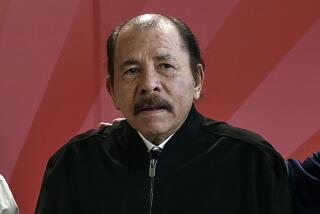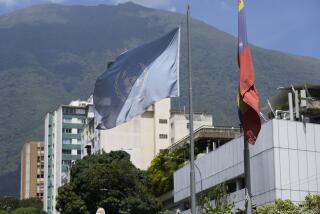Rights Suspension in Nicaragua
- Share via
The suspension of civil rights in Nicaragua should cause grave concern even among that country’s stalwart supporters. Emergency measures are more easily imposed than withdrawn. But before we join White House spokesman Larry Speakes in lambasting that unfortunate country, I suggest we all examine the cause of this situation.
Nicaragua is reeling from a U.S. trade embargo, the blocking of desperately needed international loans by the United States and the $1.5-billion damage inflicted on it by the CIA-directed contras. Nicaragua is now bracing for a major contra offensive during its crucial coffee and cotton harvests. These crops provide it with much of its foreign earnings (approximately $300 million).
The present government of Nicaragua is a legally elected coalition under Sandinista leadership. The Sandinistas drew 65% of the vote in what most of our allies regard as one of the freest elections in Central American history. The government has concluded that if it is to protect the majority of its citizens it must impose a state of emergency. The pro-contra minority is attempting, with CIA assistance, to forge an internal front to link up with the contras.
Most nations impose states of emergency during war. Nicaragua is adhering to the U.N. International Covenant on Civil and Political Rights. Article 4 of this covenant provides that “in time of public emergency, a government may take measures restricting certain rights.” The covenant prohibits a number of practices (such as state murder), which distinguish this state of emergency from a state of siege that might be imposed by Chile or South Africa. However, Article 19 of the covenant would allow the Nicaraguan government to silence the church hierarchy if it preaches against the draft or the government during wartime.
Recently, President Reagan walked out of the World Court, because he fears the judgment of this nation’s peers (the court is dominated by our allies.) He fears that the court will charge the United States with continuing acts of state terrorism against Nicaragua.
Clearly, the object of our criticism should not be Nicaragua but rather our nation’s continued illegal aggression against that country.
ANTHONY HOLDSWORTH
Oakland
More to Read
Sign up for Essential California
The most important California stories and recommendations in your inbox every morning.
You may occasionally receive promotional content from the Los Angeles Times.









